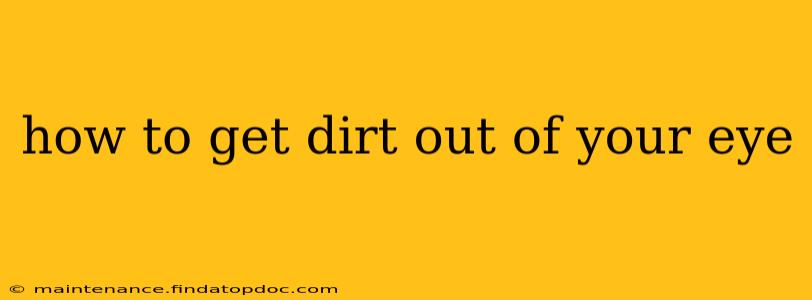Getting dirt or debris in your eye is a common and often uncomfortable experience. While most instances are minor and resolve quickly, knowing how to properly remove the irritant is crucial to prevent infection or further damage. This guide provides a step-by-step approach to safely remove foreign bodies from your eye, along with information on when to seek professional medical help.
What to Do if You Get Dirt in Your Eye
The first instinct might be to rub your eye, but resist this urge! Rubbing can scratch your cornea (the clear front part of your eye) or push the irritant further in, potentially causing more damage. Instead, follow these steps:
-
Wash Your Hands: Thoroughly wash your hands with soap and water before touching your eye. This prevents the introduction of more bacteria or germs.
-
Rinse Your Eye: Gently flush your eye with clean, lukewarm water. Use a clean cup or a clean washcloth to gently rinse the eye. The water will often dislodge the particle. Avoid using tap water if possible, as it may contain contaminants. Sterile saline solution is ideal if available.
-
Blink Repeatedly: Blinking naturally helps to lubricate the eye and can sometimes flush out the particle. Try blinking rapidly for a few minutes.
-
Check for the Irritant: After rinsing, carefully examine your eye using a mirror in good lighting. If you can see the irritant, and it's easily accessible, try gently wiping it away with a clean, damp cotton swab or the corner of a clean cloth. Do not apply pressure. If you can't see it easily or remove it, stop and seek professional help.
-
Lubricate Your Eye: After removing the irritant, use artificial tears or lubricating eye drops to soothe any irritation.
What if I Can't Get the Dirt Out?
If you've tried the above steps and the irritant remains, or if you experience:
- Severe pain
- Blurred vision
- Persistent redness
- Swelling
- Sensitivity to light (photophobia)
Seek immediate medical attention. A doctor or ophthalmologist has the tools and expertise to safely remove the foreign body and assess any potential damage. Delaying treatment could lead to complications.
How to Prevent Getting Dirt in Your Eye
Prevention is always better than cure. Here are some simple steps to minimize the risk:
- Wear Safety Glasses: When participating in activities that could potentially cause debris to enter your eyes (e.g., gardening, DIY projects, using power tools), wear appropriate safety glasses.
- Practice Good Hygiene: Regularly wash your hands to avoid transferring dirt or bacteria to your eyes.
- Avoid Touching Your Eyes: Try to avoid unnecessary touching of your eyes to reduce the risk of introducing irritants.
What if the Dirt is a Metal Shaving?
Metal shavings can be particularly dangerous because they can cause rust or damage to the cornea. If you suspect a metal shaving is in your eye, seek immediate medical attention. Do not attempt to remove it yourself.
What are the signs of an eye infection after getting dirt in my eye?
Signs of an eye infection after getting dirt in your eye can include increased pain, significantly more redness and swelling than initially experienced, excessive tearing, yellow or green discharge, and blurred vision. If you notice any of these, seek medical attention promptly.
How can I tell if the dirt scratched my cornea?
A corneal scratch, or abrasion, can cause intense pain, blurry vision, light sensitivity (photophobia), and the feeling of something in your eye even after the irritant is gone. If you suspect a corneal abrasion, seek medical attention.
Can I use hydrogen peroxide or rubbing alcohol to clean my eye?
No. Hydrogen peroxide and rubbing alcohol are harsh chemicals that can severely damage your eye. Never use these substances to clean your eye. Use only clean water or sterile saline solution.
Remember, while many instances of dirt in the eye are easily resolved at home, it's crucial to know when professional help is necessary. Your eye health is paramount, so don't hesitate to seek medical attention if you have any concerns. This information is for general guidance only and does not constitute medical advice. Always consult with a healthcare professional for any health concerns.
